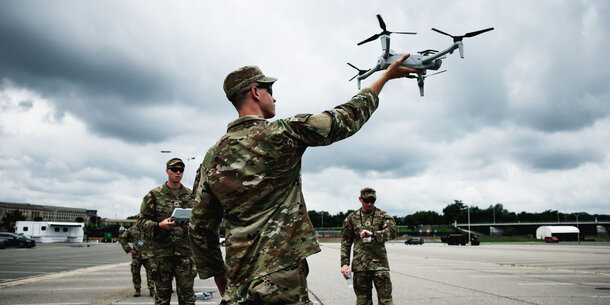“I stand here today, for the first time in 20 years, with the United States not at war,” President Biden declared last week in a speech before world leaders at the United Nations.
The withdrawal of U.S. ground forces from Afghanistan was indeed momentous. But war takes many forms. As U.S. troops boarded flights in Kabul, Biden referenced America’s persisting “over-the-horizon capabilities” in the country — a euphemism for continuing airstrikes.
Since assuming office, Biden has also launched airstrikes in Iraq, Syria, and Somalia. In September, he formally extended the 9/11 state of emergency, ensuring that a broad array of military authorities will be at his fingertips until late 2022. And even if Biden made good on his promise end to America’s wars, none of his policies would bind a future president.
Congress alone has the power to end our nation’s pattern of military interventionism. To that end, a bipartisan group of lawmakers led by Reps. Jim McGovern (D-MA) and Peter Meijer (R-MI) on Thursday introduced the National Security Reforms and Accountability Act. (A companion bill, the National Security Powers Act, was introduced in the Senate in July.) This critical legislation would keep Biden and future presidents in check by reinvigorating the War Powers Resolution of 1973.
The War Powers Resolution, enacted over the veto of President Richard Nixon after the withdrawal of U.S. forces from Vietnam, had the lofty ambition of reining in presidential war-making and restoring Congress’s constitutional prerogative to declare war. It provides that the president must consult with Congress when introducing U.S. forces into “hostilities.” If Congress does not within 90 days declare war or enact a “specific statutory authorization” to use force, any intervention abroad must cease.
Unfortunately, the War Powers Resolution neglected to define the scope of the “hostilities” that would trigger Congress’s involvement. It also failed to define the parameters of a “specific statutory authorization” to use force. These have proven to be crucial defects.
Since the law was passed, presidents have played fast and loose with the meaning of “hostilities.” Interpreting the term to exclude anything short of all-out ground combat, presidents have engaged in military operations around the world without proper congressional oversight or approval.
In 1983, President Ronald Reagan declined to acknowledge the existence of “hostilities” when 1,400 U.S. marines stationed as peacekeepers in Lebanon exchanged fire with opposing forces and took casualties. Similarly, in 1984, the Reagan administration felt no need to consult with Congress about its deployment of U.S. forces to provide assistance in El Salvador’s civil war, even though they repeatedly came under enemy fire in the country. Fast-forwarding to 1999, President Bill Clinton actively avoided referring to U.S. airstrikes in Kosovo as “hostilities,” indicating that he would consult with Congress only “with regard to the introduction of ground forces.” In the same vein, the Obama administration argued that its 2011 airstrikes in Libya did not require congressional approval because they were “limited in nature, scope, and duration.” Thus, successive presidents have intervened in Africa, Asia, Europe, and Latin America, all while evading the dictates of the War Powers Resolution.
In addition, the War Powers Resolution’s lack of clarity on what constitutes a “specific statutory authorization” to use force allowed the scope and purpose of conflicts to metastasize. Presidents Bush, Obama, Trump, and Biden have stretched existing statutory authorizations — the 2001 and 2002 Authorizations for Use of Military Force (AUMFs) — far beyond their text.
The 2001 AUMF, which authorized force against “persons [who] planned, authorized, committed, or aided the terrorist attacks that occurred on September 11,” was used as a mandate to engage in a protracted, misguided, and extremely costly state-building effort in Afghanistan. Furthermore, the 2001 AUMF was and continues to be used to justify military operations against terrorist groups that did not even exist on 9/11. Likewise, the 2002 AUMF, which addressed the purported threat posed by Iraq under Saddam Hussein, has been wielded against groups and people who have little or no connection to Iraq.
By interpreting “hostilities” narrowly and overreading the 2001 and 2002 AUMFs, presidents have avoided consulting with Congress on direct military engagement in at least 12 countries other than Iraq and Afghanistan, ranging from Mali to the Philippines. For a decade, even Congress was in the dark about where and against which groups America was using force.
The National Security Reforms and Accountability Act would end such abuses. The legislation defines “hostilities” to clarify that any use of military force abroad triggers the president’s obligation to consult with Congress. It specifies that “hostilities” include force that is “intermittent,” such as airstrikes, as well as force that is used to assist foreign countries fighting their own domestic conflicts, as in Somalia, Mali, and the Philippines. It explicitly prohibits the use of force without prior congressional authorization unless such force is “necessary” to repel an imminent attack or respond to a concrete and immediate threat against the United States.
Just as important, the legislation defines “specific statutory authorization.” In order to qualify as congressional approval to use force under the War Powers Resolution, an AUMF must articulate operational objectives; identify the groups against which the president may use force; and identify the countries where the president may use force. AUMFs must also expire within two years of enactment, with the option of congressional renewal.
Had these criteria been in place, it is far less likely that our engagements in Afghanistan and Iraq would have dragged on as long as they did, and our many military adventures outside those countries would have been limited to those Congress was willing to authorize.
Although the definitions of “hostilities” and “specific statutory authorization” are the key provisions of the National Security Reforms and Accountability Act, the legislation has more to offer. It brings the War Powers Resolution into the modern age by recognizing that cyberattacks can rise to the level of a use of force and warrant congressional oversight. It closes a loophole in the War Powers Resolution that permits the president to wage three months of unfettered war by simply attesting that continued uses of force are an “unavoidable military necessity.” And it permits Congress to seek judicial review of War Powers Resolution violations. Finally, the bill requires the president to publicly describe and justify any authorized uses of force on a monthly basis.
The National Security Reforms and Accountability Act and its Senate counterpart demand a level of presidential transparency and accountability, as well as congressional responsibility, that the War Powers Resolution aspired to but failed to achieve. To prevent future presidential war-making — whether in the form of ground combat or lethal drone strikes — Congress should pass this legislation.



